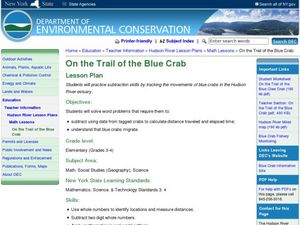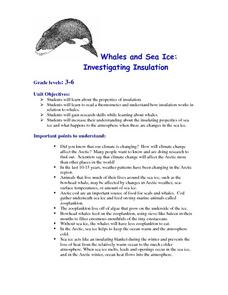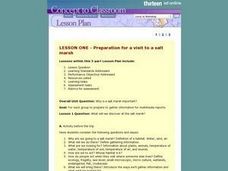Curated OER
Oceans in Motion
This simple activity introduces children to basic marine life as well as to show them the necessity of protecting aquatic environments. Some famous marine life animals are introduced via vocabulary words, then children cut out pictures...
Curated OER
Life is Weird
Separate your science class into small groups and assign each a specific deep-sea organism to research. The class will learn about all of the organisms as each group presents their assigned animal. Following their presentations, you can...
Curated OER
Reef Sharks!
Students visit an ocean aquarium exhibit where they can observe Black tip reef sharks. They observe the shark's behavior and read any information exhibited on the walls. They complete a worksheet based on information collected.
Curated OER
My Own Backyard
Scholars create a drawing of their own backyards. They will use a visualization technique to sketch their own backyard onto construction paper using oil pastels. Guiding questions are given along with materials for the project....
Curated OER
Ray Reading Comprehension Worksheet
In this rays worksheet, students read a short factual text about the ray. Students answer 4 short answer questions and color a large picture of a ray.
Curated OER
Lobster Word Search
In this lobster vocabulary activity, students analyze 10 words in a word box that pertain to lobsters. Students find each word in a word search puzzle.
Curated OER
Crab Alphabet Activity
In this crabs activity, students explore crab vocabulary words and practice their alphabetical order knowledge. Students place ten words in ABC order.
Curated OER
How Big Is A Humpback Whale?
Learners explore humpback whales. In this humpback whale lesson, students determine the actual size of humpback whales and use diagrams to identify the major features of the humpback whale.
Curated OER
On the Trail of the Blue Crab
Third graders read the article "Blue Claw," discuss crab migration, and look at a map of the Hudson River. They complete a worksheet where they must use subtraction to determine the distance migrating crabs travel.Web links, article, and...
Curated OER
Dining Out With Fishes of the Hudson
In this reading comprehension activity, 5th graders read information and complete 3 activities based on the information they have read.
Curated OER
Habitats and Adaptations
Students research and describe the habitat and adaptations of a reef animal. After the student is assigned a habitat, they design and draw a cresture adapted to eat each food and to live in each habitat.
Curated OER
Addition with Regrouping
In this regrouping in addition worksheet, students use the table for the 'Threatened and Endangered Animals' and their numbers to solve the addition problems that utilize regrouping.
Curated OER
Swimming With the Crabs!
In this environmental science activity, students complete a graphic organizer (Frayer model) on blue crabs. They write an article using the given facts.
Curated OER
Plankton / Phytoplankton
Students discuss the importance of plankton in the ocean ecosystem. In this biology lesson, students identify the different types plankton by observing them under the microscope. They explain how plankton population affect global climate.
Curated OER
Whales and Sea Ice: Investigating Insulation
Young scholars investigate the properties of insulation as it relates to whales and sea ice. They research whales and examine the atmospheric changes that occur when there are changes in sea ice.
Curated OER
Whale Blubber
Students examine the purpose and characteristics of whale blubber. They work together to complete an experiment to test the fat as an insulator. They discover how humans use materials to protect them from the cold.
Curated OER
Marine & Aquatic Habitats Activities - Terrestrial Forests vs. Kelp Forests
Students discuss concept and specificity of habitats, both marine and terrestrial, list similarities and differences in the habitats of a kelp forest and a terrestrial forest, compare types of organisms that occupy corresponding types of...
Curated OER
Under the Sea Webquest
Fourth graders work in small groups to research a selected species of ocean creature. They conduct Internet research, complete a WebQuest and worksheet, and complete a group oral presentation that includes an illustration of the food...
Curated OER
Create An Insect
Students create a new species of insect. They create a list of insect characteristics and use this as a springboard to draw an insect of their own. Students write a brief descriptive paragraphs about their insect, giving particular...
Curated OER
Exploring the Great Salt Lake
Third graders participate in a scavenger hunt, looking for things that are unique about the ecosystem in and around the lake. They observe and describe a variety of habitats and distinguish living and nonliving elements of...
Curated OER
Wild Arctic
Students explore key terms, including food web and food chain. They discuss Arctic plants and animals, devise at least three Arctic food chains and create a food web showing connections among Arctic life.
Curated OER
Why is a salt marsh important?
Students discuss the salt marsh. They define the following terms: habitat, water, land and air. Students work in small groups. They are asked why are they going to a salt marsh? Students discuss whose habitat is it at the salt marsh.
Curated OER
The Effects of Temperature Variations on the Heartbeat Rate of Daphnia
Young scholars use DigiScope technology to investigate Daphinia, popularly known as water fleas. They design, conduct, and report on an experiment to determine the effects of varying water temperatures on the heartbeat rate of Daphnia.
Curated OER
Invertebrate Vocabulary-- Marine Invertebrate Match
In this science worksheet, students study 12 vocabulary words which pertain to marine invertebrates. Students read the definitions which include pronunciation, part of speech and meaning of the name. Students then look at 16 organisms...
Other popular searches
- Marine Crustaceans
- Shells and Crustaceans
- Crustaceans of the Ocean
- Crustaceans Kindergarten
- Crustaceans 2nd Grade
- Crustaceans Animals

























